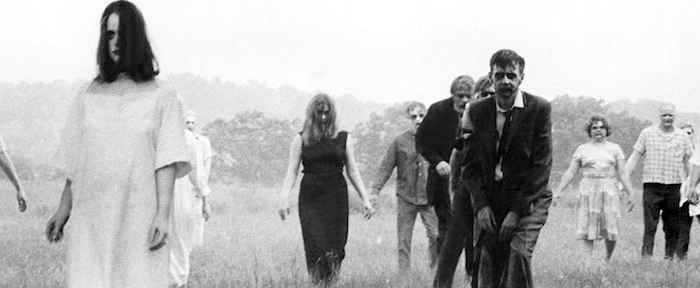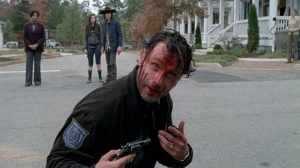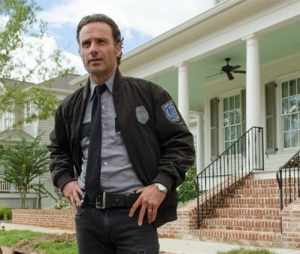The Walking Dead: Rick vs Deanna

“When I was a kid, I asked my grandpa once if he ever killed any Germans in the war. He wouldn’t answer. He said that was grown up stuff, so…. So I asked if the Germans ever tried to kill him, but he got real quiet. He said he was dead the minute he stepped into enemy territory. Every day he woke up he told himself, ‘rest in peace—now get up and go to war.’ And then after a few years of pretending he was dead, he made it out alive. And that’s the trick of it, I think. We do what we need to do, and then we get to live. But no matter what we find in D.C. I know we’ll be okay, because this is how we survive. We tell ourselves that we are the walking dead.”
(Rick Grimes, Season 5 Episode 5)
Zombies have become something of pop culture phenomenon, and are arguably the most distinguished cultural icon to represent a product of the ruling class’ hegemony and cultural reign during the 1960s: Communism- or more precisely, the fear of it. Adam Lowenstein describes Night of the Living Dead, the very first critically acclaimed zombie movie, released in 1968 (IMDb) as “an allegorical commentary on America eating itself alive through the contemporary trauma of Vietnam” (Lowenstein, 2010). But, after the end of the war, Communism no longer presented a threat to American society, and zombies took a back seat in popular culture. Yet, the connection is still understood, as Bryce Peake writes in Anthology Now Magaine, “the connection between zombies and warfare is by no means a stretch of the imagination.”

Peake continues, saying, “The zombie motif remains, yet the monsters have been transformed in ways that more closely resemble terrorist sects and sleeper cells than the masses we feared we might become” (Peake); indicating the hegemony and ideologies from the 1960s that birthed the zombie as a pop culture icon are not lost on the new generation. This same kind of ruling hegemony and reign over ideologies is presented in the mediums through which zombies, and even the humans that must restructure themselves around the zombies, are portrayed – usually some kind of post-apocalyptic struggle for dominance, as seen in one of the world’s most successful television series of this decade, The Walking Dead. This article will take a look into the role of hegemonies as they pertain to this “struggle for dominance”; particularly involving the humans and how they must re-evaluate their living conditions in order to govern themselves, as well as the varying types of leadership styles and how each affects the other, through the theories of various popular social and political theorists – focusing specifically on the most recent season, season 5.
The Walking Dead
The Walking Dead portrays yet another post-apocalyptic scenario in which you see people trying to regain a sense of civility and govern themselves in a world lacking any form of government. The main character, Rick Grimes, becomes the leader of his group through his display of strength, loyalty, and leadership. He was accepted as the leader of his companions without too much disagreement from the very beginning. However, after realizing the intense side effects of having to kill-or-be-killed, Rick decides to step down from his leadership. Unfortunately, he is forced to perform the role once again, after their makeshift home in a Georgia prison is destroyed by the ruthless leader of a neighboring community, known as the Governor. Rick decides to lead his people up to Virginia, with the hope that the rumor of a safe settlement is still true enough for them to find a place to live. When they reach their destination, Rick decides to scope out the place before entering, for the safety of his group and in fear of an all too familiar bait-and-lure scenario.

Coincidentally, before they can spy, one of the community’s scavengers approaches them and, under much duress, Rick agrees to be lead to the settlement. Once there, it is revealed that the leader of the community, Deanna – a keenly intelligent former Ohio congresswoman – sought out Rick and his group with a purpose. Deanna acknowledged that Rick and his group have lived through this apocalypse differently than she and her people had – from behind the walls of the Alexandrian Safe-Zone – and believes that Rick has the experience to teach her people how to not only live, but to survive.
However, because of Rick’s gruff attitude and – albeit, justly instilled – trust-issues, the people of Alexandria find it difficult to trust him as a leader. The struggle between the Alexandrians fighting for their pre-established way of life and Rick integrating himself as their new co-leader mirrors the cultural struggle Stuart Hall discusses.
Hall writes, “The capacity to constitute classes and individuals as a popular force – that is the nature of political and cultural struggle: to make the divided classes and the separated peoples – divided and separated by culture as much as by other factors – into a popular democratic force” (Hall). Rick and the Alexandrians are separated by a difference in their cultures, a difference that Deanna wants to resolve, for the sake of her people’s survival. Here, we will explore the relationship between Rick and Deanna, analyzing how their distinct leadership styles conflict, and on what levels they will have to meet in order to successfully lead their people into a better future.
Rick Leading in Alexandria

Unfortunately, Rick will have to cross a few barriers in order to be accepted as a leader in Alexandria. To resolve the struggle for dominance between the Alexandrians way of life and his, Rick will have to take in to consideration how the instilled hegemony works and calculate how to his role as a leader will affect them as a whole in order to integrate himself into their society as peacefully as possible. Antonio Gramsci writes “the supremacy of a social group manifests itself in two ways, as ‘dominance’ and as ‘intellectual and moral leadership’” (Gramsci), two characteristics that Rick frequently displays through his leadership.
Gramsci continues, saying “A social group dominates antagonistic groups, which it tends to ‘liquidate’, or to subjugate perhaps even by armed force; it leads kindred and allied groups (Gramsci). Again, Rick also portrays these aspects; whether it be taking down an enemy community that threatened his own or putting the rebellious of the Alexandrians in their place when they question his leadership.
Rick picks and chooses who is worthy of his trust, and protects those who are, while destroying those who are not; which is something that the Alexandrians aren’t used to – after being governed under Deanna’s passive, diplomatic rules for so long – and something that Rick has so vigorously ingrained within himself as the only logical way to protect what he loves, as the quote featured at the beginning of the article suggests. One of Rick’s main struggles involves the exact reason Deanna sought them out in the first place – Where Deanna has simply being trying to preserve a way of life for her people, Rick knows how to survive. However, they quickly come to understand that the rules required for “surviving” are quite different and less diplomatic than the ones for simply “living.”
Gramsci goes on to say “A social group can, and indeed must, already exercise ‘leadership’ before winning governmental power” (Gramsci). Rick must prove himself a worthy leader to the Alexandrians before they will accept him, which may be a difficult task with his tendency for violence. However, Gramsci defines the event as “The ‘normal’ exercise of hegemony … is characterized by the combination of force and consent … It is always made to ensure that force will appear to be based on the consent of the majority” (Gramsci). This indicates that the course Rick must take in order to become a leader for the Alexandrians is undeniable. He must be granted their “consent” in order to lead them.
Consent in Leadership
Gramsci also hints at the relationship between hegemony and another ideology in saying that this “consent” is “expressed by the so-called organs of the public opinion – newspapers and associations … “ (Gramsci) which are also features in Ideological State Apparatuses, or ISAs. Louis Althusser defines ISAs as “a certain number of realties which present themselves to the immediate observer in the form of distinct and specialized institutions” (Althusser, 302). In other words, ISAs are “realities” or truths that are deemed as obvious to society because of the medium through which we were exposed to them; such as schools, churches, media outlets, art, and literature. The connection between the functions of hegemony and ISAs are found in ISA’s partner, the Repressive State Apparatus, or RSA. In difference to ISAs, which have many mediums, there is only one kind of RSA, and its definition is what sets it apart from the functionality of ISAs. Althusser describes the difference as “the Repressive State Apparatus functions ‘by violence’, whereas the Ideological State Apparatuses function ‘by ideology’” (Althusser, 303).

We can see this struggle take a physical form in the difference between Deanna’s leadership style, which is more ideological, and Rick’s, which is definitely more violent. Deanna notices the difference as well, and realizes that her people cannot survive in this post-apocalyptic world under the ideological rule alone. She sees the role of the RSA in Rick, and wants him to play that part in her community. But, Rick’s tendency for violence isn’t the only functionality of his leadership. As with Rick and Deanna, the ISAs and RSAs have a little bit of each other’s traits, as Althusser clarifies “the (Repressive) State Apparatus functions massively and predominantly by repression (including physical repression), while functioning secondarily by ideology”, and vice versa. The ISAs function “massively and predominantly by ideology, but they also function secondarily by repression” (Althusser, 303). Where Rick represents the RSA, and is more likely to kill you as punishment if you break a rule or cross him, Deanna is more likely to exile you from the community or have you jailed for an amount of time. These two functions work together to create leadership, which is why Deanna was so intent on having Rick lead by her side.
Leading Together
Rick’s struggle to integrate in to the Alexandrian community is a representation of the struggle between hegemony and leadership, as well as the functionality of the partnership between Ideological State Apparatuses and Repressive State Apparatuses. Rick must come to terms with the fact that leadership is based on “consent,” and that his role as a leader in the community must consist of both ideological functions, as well as his repressive functions. Gramsci warns “One should not count solely on the power and material force which a position gives in order to exercise political leadership” (Gramsci), which is solid advice for both Deanna and Rick, indicating that they both must get in touch with the other side of their roles – Deanna with her repressive side and Rick with his ideological side – in order to lead their people properly. It would seem that Althusser agrees with the relationship between Gramsci’s take on hegemony and his understanding of the State Apparatuses in saying, “To my knowledge, no class can hold state power over a long period without at the same time exercising its hegemony over and in the Ideological State Apparatuses” (Althusser, 304). Because of Rick and Deanna’s opposite leadership styles, they make the perfect subjects for this analysis; and their decisions – driven by their distinct leadership styles – will eventually portray the characteristics attributed to both styles.

Works Cited
Althusser, Louis. (2009) “Ideology and Ideological State Apparatuses.” (John Storey) Ed. Cultural Theory and Popular Culture. (4th ed.) pp.302-304.
Gramsci, Antonio. (2009) “Hegemony, Intellectuals and the State.” (John Storey) Ed. Cultural Theory and Popular Culture. (4th ed.) p. 75.
Hall, Stuart. (2009) “Notes on Deconstructing ‘the Popular’.” (John Storey) Ed. Cultural Theory and Popular Culture. (4th ed.) p. 518.
Kisantal, Tamás. “Living in the Post-Apocalyptic World | Kisantal | Groniek.” Living in the Post-Apocalyptic World | Kisantal | Groniek. Web. 27 Nov. 2015.
Lowenstein, Adam. “Living Dead: Fearful Attractions of Film”. Representations 110.1 (2010): 105–128. Web. 25 Nov. 2015.
“Night of the Living Dead.” IMDb. IMDb.com. Web. 25 Nov. 2015
Peake, Bryce. “The Zombies of Toronto”. Anthropology Now 2.3 (2010): 65–73. Web. 25 Nov. 2015
What do you think? Leave a comment.










Deanna is a know-it-all who makes bad judgment calls. She puts her inept son Aiden, in charge of runs. She exiles the a sociopath, Negan, whom she should have killed. She can’t read people as well as she thinks she can, but she’s in charge.
Yes, yes, yes. Totally useless.
I’m used to TWD using filler episodes to build up to a big midseason finale, but apparently now they use midseason finales as filler to build up the midseason premieres?
Negan isn’t even here yet. Wait for the lord.
Didn’t we already do “Negan” with the “Governer”? Or the leader of Terminus?
Another big bad for the group to destroy.
No, because neither the governor or any of the termites had a baseball bat.
After Negan, I believe the next big bad leader uses a piece of rotted cardboard that has the flesh eating virus on it so he too will be different.
All these bad guys are unique in their own way so the show is fresh every season.
Loved the flashback Morgan episode. One of the better episodes of tv I’ve seen this year.
And I really thought they were going to kill Glenn off after bringing him back. Just to piss people off.
This was an interesting comparative analysis on leadership styles. The contrast between the two leaders in Season 5 of the Walking Dead was a point of contention. The conflict between the styles was obvious yet, there was some resolve. However, Deanna’s style is a mute point now. Do you think this was a reflection of how her style may or may not be efficient in an apocalyptic setting?
And it will be a Happy Valentine when TWD returns <3 <3
All of these apocalyptic survivor shows have the same plot, a handful of good guys try to retain their humanity while fighting off can abilities bad guys.
Never quite understood why they just don’t eat the billion tons of leftover canned or dry food.
Also don’t understand why the slow shuffling zombies arnt all just eaten by dogs. My jack Russell would make short work of the bastards and just run off with a leg in its mouth for dinner.
Tainted meat.
Jack Russells are clever dogs. Yours would survive by eating you.
The show has tried to introduce new characters at the expense of older ones, but then you can’t actually recall any of the new ones.
I feel this is because they have been overpowered by the more established characters in understanding how to survive. There have been many episodes of Alexandria residents who were either non-responsive and/or in denial about how brutal their world is outside their walls, sometimes at the expense of their life. Hence why the established characters have been prominent in overshadowing newer characters.
Why did they kill off denna 🙁
I think it had to happen for Rick & Co to finally accept the others as part of the group.
Morgan is/was wrong with saving the Wolf dude but Carol’s also wrong. You can’t just kill people. She’s going down the path that Carl was on but fortunately, with the help of Hershal, Rick was able to bring him back.
But Carol was very clear that she didn’t want to kill Morgan, but that she would if he didn’t step away from the Wolf. That’s not someone who’s lost control of herself; rather, someone who’s very aware of herself and the repercussions of her actions. The only person I see not valuing life here is Morgan.
Sad for Deanna and Denise..
Not me.
Great show. Keep em coming.
The idea of Alexandra being some new age liberal commune has removed a lot of the tension from the show, as we know their is nothing sinister to them, unlike Terminus. I think the wolves were also killed off too early and easily.
Great article and good work
Just horrible; don’t know why I keep getting sucked into watching. Instead of getting better, each episode is worse than the one before.
Carol vs. Morgan showdown was intense!!!! I like Morgan but now he’s a pain in the ass for me to watch. He better not ”may have” kill Carol with hard body slam to the floor I was like WTF!!!!!!!!! Carl should have shot that SOB in the FACE while he had the chance! Plus I knew Deana was a goner in the last ep.
I like how you explored the possible implications of Deanna as the leader, Rick as the leader, and both as leaders together. I wrote a paper last year about shifts in survivor group morality with the progression of The Walking Dead, and it was interesting to explore how different ethical methodologies stand up in the post-apocalyptic world.
This is a wonderful article. After watching the previous episode, I am anxious to see what Neagen will do for the series (I’ve been led to believe he’s far more evil than the Governor). Also, I am excited to see how Carl will overcome his new weakness.
Loved this article
Is Morgan the new Deanna? Building a jail, resisting attacks on other “living” humans, trying to preserve life generally.
Deanna was a smart woman, but she didn’t have the outside experience to truly understand what was going on. She realized this quickly, which is why the transition from her to Rick as leader went so smoothly. It was really sad to see her go, but her ending was very powerful.
Solid analysis from a truly social scientific perspective. Not going to lie, I had been wanting to read this article for a while, but insisted on waiting until I was caught up with the series to avoid any possible spoilers (not yet realising that this was written before season six aired). I’ll admit, seeing your title for all those months made me expect more of a dramatic conflict between Rick and Deanna, but I really appreciated how the show explored their subdued understanding of one another, which you described and explained well.
This is incredibly well researched. I definitely agree that in a way, both Rick and Deanna kind of needed one another. Deanna needed Rick to bring the harsh reality that life isn’t as pleasent as the confined walls of Alexandria lead us to believe. Rick needed Deanna, because he was becoming cold. His group was built upon building friendships with other wanderers and that’s something he kind of forgets when he gets to Alexandria. I think Deanna’s death is kind of symbolic for blind idealism. It’s good to be optimistic, but not to ignore reality. It also leads into those moments where Rick was being reminded that he had his people, but now the Alexandrians are part of his people too.
very nice research on this. agree with you.
So satisfying take on this season. I wasn’t very convinced with the opening arguments of this article, but I found the last paragraph so well articulated…